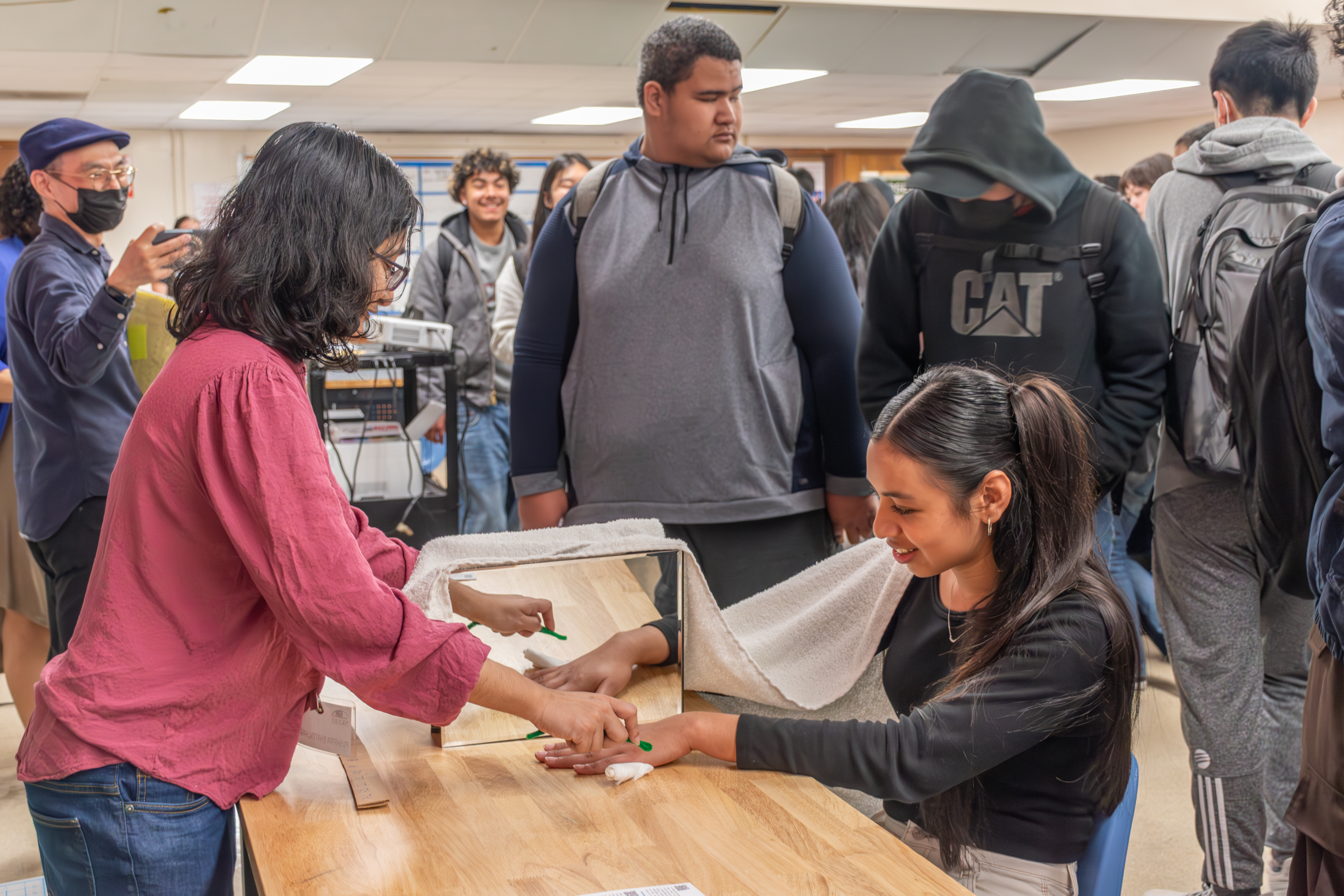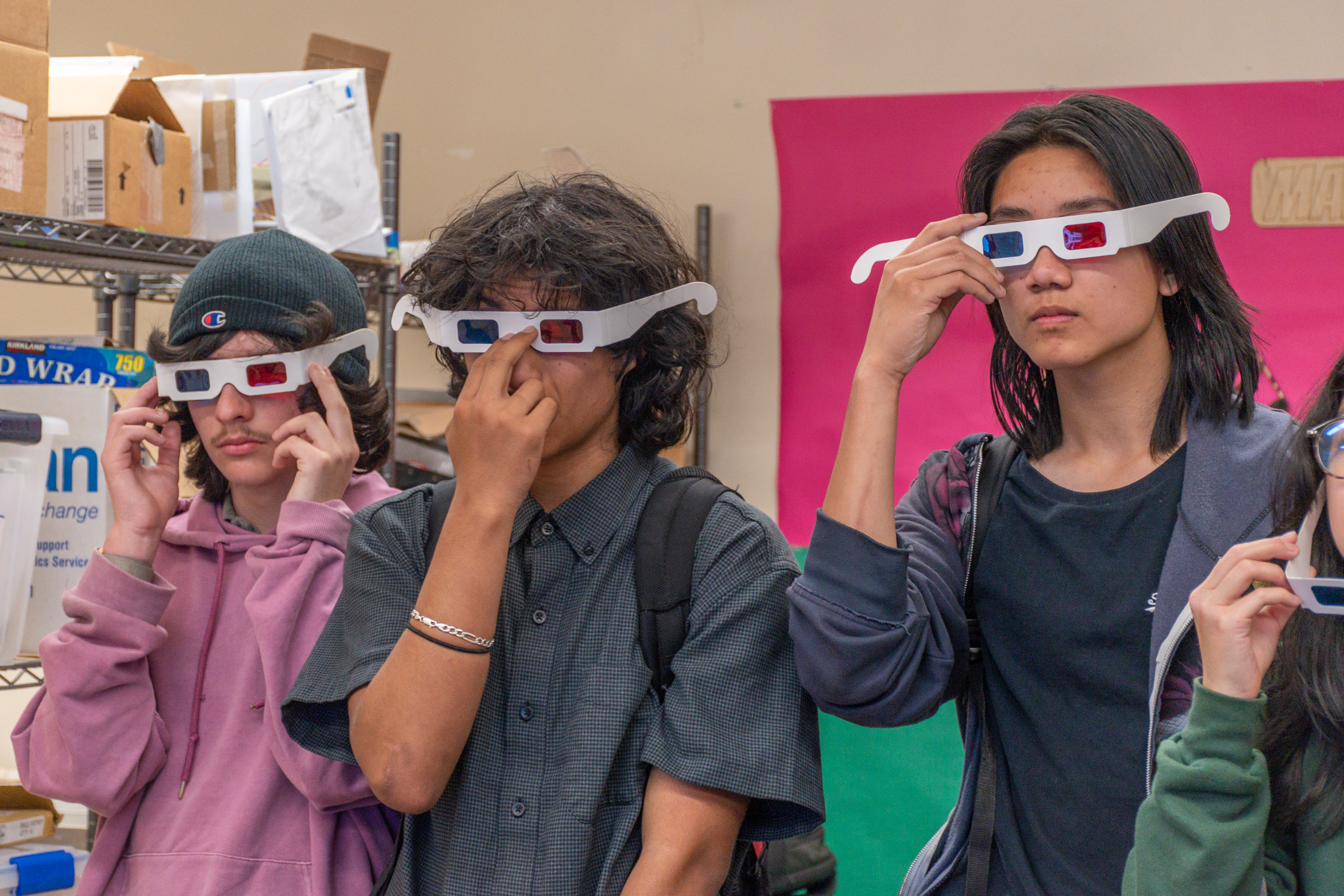
On April 18, 2024 SKERI scientists enjoyed the beautiful Phillip and Sala Burton Academic High School campus while offering its students hands-on, experiential, and interactive examples of SKERI's scientists' work.

The group of SKERI scientists included James Coughlan, Santani Teng, Haydée Guadalupe García-Lázaro, Pushpita Bhattacharyya, Jade Guenot, and Adrien Chopin.
 James Coughlan discussed the importance of engineering for creating non-visual tools to interact with tactile graphics. He demonstrated the CamIO (“Camera Input-Output”) application, which makes physical objects such as documents, maps, devices and 3D models more usable by blind and visually impaired persons. In the hand-based implementation of the CamIO app, the user points to a location on an object and hears information about that location read aloud. This project is part of the Coughlan Lab's goal to develop and test assistive technology for blind and visually impaired persons that is enabled by computer vision and other sensor technologies.
James Coughlan discussed the importance of engineering for creating non-visual tools to interact with tactile graphics. He demonstrated the CamIO (“Camera Input-Output”) application, which makes physical objects such as documents, maps, devices and 3D models more usable by blind and visually impaired persons. In the hand-based implementation of the CamIO app, the user points to a location on an object and hears information about that location read aloud. This project is part of the Coughlan Lab's goal to develop and test assistive technology for blind and visually impaired persons that is enabled by computer vision and other sensor technologies.
 Santani Teng and members of his lab, Haydée Guadalupe García-Lázaro and Pushpita Bhattacharyya, used an interactive demo experiment to demonstrate some of the techniques they use in the lab to study human echolocation. They also used a mirror-based illusion to demonstrate how vision can be used to ‘trick’ other senses, creating illusions like feeling touch outside one's body, or experiencing one's hand in a different location. These experiments illustrate questions investigated in the Teng Lab about how the presence or absence of vision can influence the brain’s processing of other senses, such as hearing and touch - for instance, how people who are blind from a young age can learn to use sound to ‘see’ and navigate the world.
Santani Teng and members of his lab, Haydée Guadalupe García-Lázaro and Pushpita Bhattacharyya, used an interactive demo experiment to demonstrate some of the techniques they use in the lab to study human echolocation. They also used a mirror-based illusion to demonstrate how vision can be used to ‘trick’ other senses, creating illusions like feeling touch outside one's body, or experiencing one's hand in a different location. These experiments illustrate questions investigated in the Teng Lab about how the presence or absence of vision can influence the brain’s processing of other senses, such as hearing and touch - for instance, how people who are blind from a young age can learn to use sound to ‘see’ and navigate the world.
 Jade Guenot and Adrien Chopin are both postdoctoral fellows in the Verghese Lab, which studies the mechanisms of healthy vision and action and the basis of attention and visual adaptation in clinical populations. Dr. Chopin discussed the importance of binocular vision for the development of good depth perception and demonstrated how it works using demo experiments. Dr. Guenot demonstrated how patients with central visual field loss due to an eye disease called macular degeneration perceive the world and how she can study their impaired perception of depth.
Jade Guenot and Adrien Chopin are both postdoctoral fellows in the Verghese Lab, which studies the mechanisms of healthy vision and action and the basis of attention and visual adaptation in clinical populations. Dr. Chopin discussed the importance of binocular vision for the development of good depth perception and demonstrated how it works using demo experiments. Dr. Guenot demonstrated how patients with central visual field loss due to an eye disease called macular degeneration perceive the world and how she can study their impaired perception of depth.
IGNITE (Inspiring Girls Now in Technology Evolution) Worldwide works directly with educators to introduce girls and young women to STEM opportunities during the school day. IGNITE events connect STEM professionals to the participating students.
